- Home
- About
- Student Led
- Research Informed
- Practice Focused
- Resources
- Case Studies
- Green Labs Community
- News
- Office of Sustainability and Climate Action
Water Management
UCC Water Mangagement
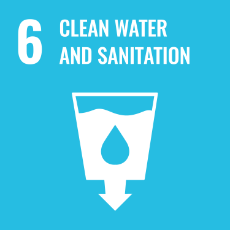 70% of our planet is covered in water, 97% of which is made up of sea water, unsuitable for human consumption. The remaining water is in the form of fresh water which is stored in glaciers, ice caps and aquifers. Some estimates calculate that only 0.75% of the world’s water suitable for human consumption is easily accessible.
70% of our planet is covered in water, 97% of which is made up of sea water, unsuitable for human consumption. The remaining water is in the form of fresh water which is stored in glaciers, ice caps and aquifers. Some estimates calculate that only 0.75% of the world’s water suitable for human consumption is easily accessible.
Globally water scarcity is on the rise as populations increase, water pollution rises and intensification of agricultural and industrial processes increase.We all know that water is essential to life on Earth and that we need to act to reduce water pollution, protect fresh water sources and reduce water use where we can.
Water Stewardship Charter
Here at UCC we have been implementing a water conservation program over the last 15 years with the goal of minimising our water consumption. Through our building design guidelines, water metering programs and system upgrades the University continues to reduce its water consumption levels. In our 2016 Sustainability Strategy the University committed to the development of a water management plan and in 2019 the Estates office became a Certified Water Steward with the help and guidance of Irish Waters excellent Water Stewardship Program. Through the program the Estates office developed a water charter, outlining 12 priority areas for the University to action on which range from creating awareness of water conservation across the University, installation of additional water metering and improved operational controls across the Estate.
Monitoring Water Consumption & Identifying Significant Users
In a typical year the University uses 130,000 m3 of freshwater across the estate. The main consumers of water are the cafes, restaurants, toilets systems, drinking fountains, research labs and deionized water generation plants. Our most recent water study indicated that out of 102 separate water accounts, 6 consume over 81% of our annual water use. Needless to say one of our current priorities is focussed on mapping out the water users in those buildings and implement water conservation measures, which we have already started with and seen some significant success.
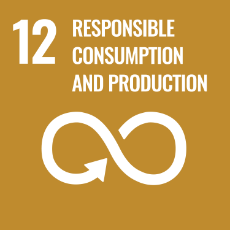 Implementation of Water Conservation Initiatives
Implementation of Water Conservation Initiatives
Over the years the Engineering services department has carried out a number of water conservation initiatives across our estate and as a result we now operate at 18% below our 2009 consumption rates, despite a significant growth in the size of our Estate. Some initiatives completed include:
- Embedding water conscious behaviour in the campus community through education & awareness.
- Upgrading to water efficient facilities including sensor technology & dual flush.
- Installation of water flow restrictors on tap outlets and sensor technology.
- Comprehensive underground leak detection & remediation program.
- Installation of metering and alarming systems to identify any leakage, excess consumption.
- Auto water shut offs to match building opening times.
- Use of grey water reuse systems for toilet flushing (Figure 1).
- Use of rainwater harvesting for toilet flushing, plant watering and use in glasshouse facilities.
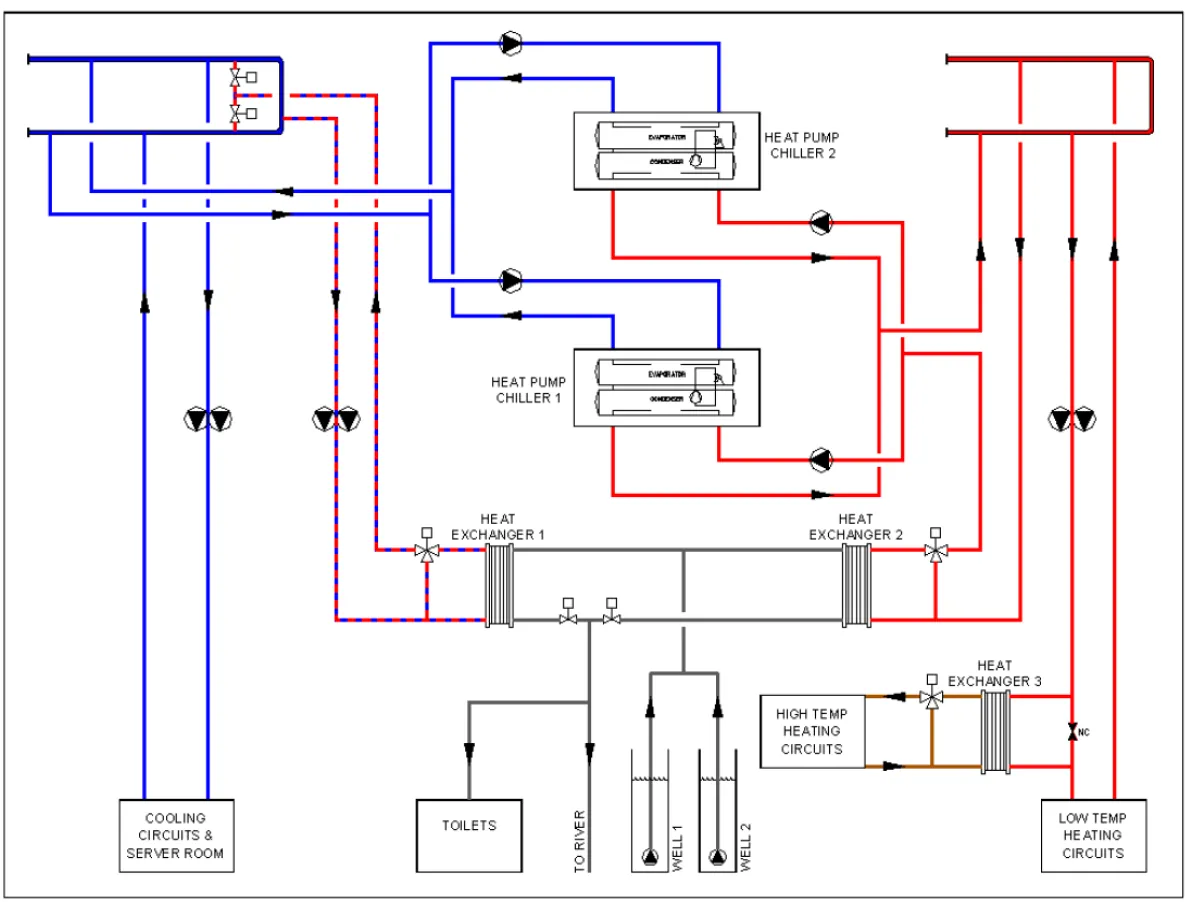
Figure 1. Diagram illustrating the reuse of discharge water from the Ground Source Heat Pump (GSHP) to fill water storage tanks used in the flushing of toilets at one of our buildings. For example, grey water from GSHP in the Western Gateway Building feeds WC Tanks with an average of 10m3 per day.
The installation of water metering and alarming has proven to be particularly effective in the early identification of underground leaks on main campus, given the age and vastness of the underground network. Through our online metering platform (Figure 2) you can see that on Main Campus, the consumption profile closely follow the building opening times and high occupancy patterns, peaking at 21,000L by midday and dropping down to 100L per hour overnight. Alarm alert limits are set on the night-time load to alert the Estates office to any excess use that might indicate a large underground leak.
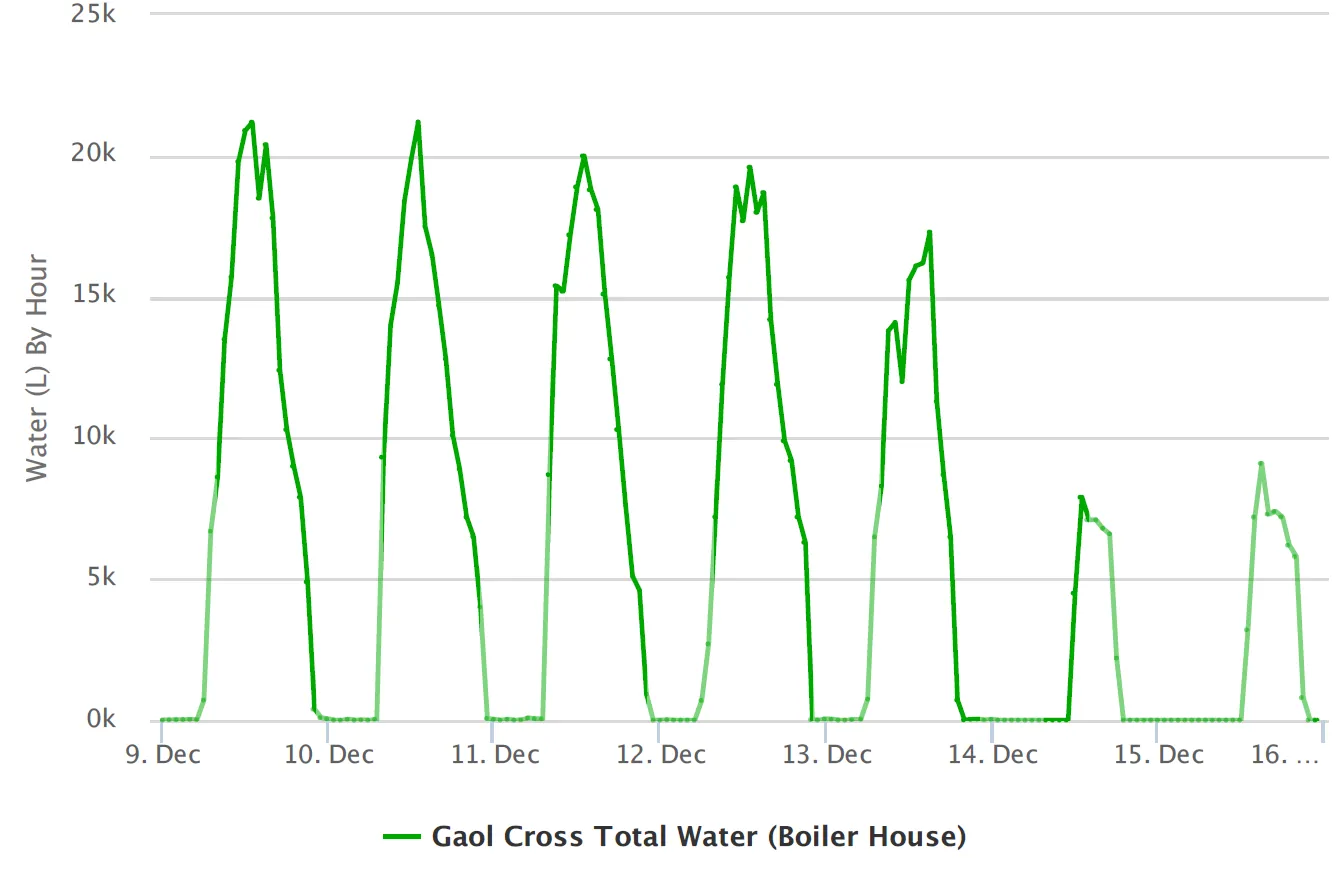
Wastewater Treatment
Irish law requires that all businesses (including Universities & Colleges) that discharge ‘Trade Effluent’ to the public sewers have a ‘Trade Effluent License’. Trade effluent discharges to sewer are regulated by Irish Water or the EPA. Trade effluent is defined as any liquid waste (other than domestic wastewater and storm water) that is discharged from a business premises to the public sewers. Trade effluent may contain materials such as fats, oils and grease, chemicals, detergents, or food waste. As a campus that incorporates food services, research facilities and a sports arena, University College Cork must thus comply with the conditions of our Trade Effluent License.
All wastewater generated by UCC is discharged to the Cork City sewer network for treatment at a municipal wastewater treatment facility operated by Irish Water/local authority. At the wastewater treatment facility wastewater undergoes an 8-step process. During this eight step process all solid materials are removed, the water is biologically treated, nutrients are removed and pH is neutralised. All treated wastewater must then go through a quality control process to meet Environmental Protection Agency standards prior to be discharged to the sea. For a detailed description of the treatment process and discharge quality standards see:
Building & Landscape Design
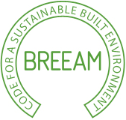 More stringent building regulations, overlayed with UCC’s additional building design guidelines ensures that any new buildings or significant refurbishment programs are designed, constructed, and operated with water conservation technology and processes in place. For example all new buildings and major renovation projects must achieve BREEAM Excellent Standard. BREEAM Excellent standard encourages sustainable water use in the operation of the building and its site, including reducing water consumption (internal and external) over the lifetime of the building and minimising losses through leakage.
More stringent building regulations, overlayed with UCC’s additional building design guidelines ensures that any new buildings or significant refurbishment programs are designed, constructed, and operated with water conservation technology and processes in place. For example all new buildings and major renovation projects must achieve BREEAM Excellent Standard. BREEAM Excellent standard encourages sustainable water use in the operation of the building and its site, including reducing water consumption (internal and external) over the lifetime of the building and minimising losses through leakage.
All design teams working on UCC Capital Projects are asked to employ Sustainable Drainage Systems which both help attenuate storm water and prevent pollution of surface waters by runoff. These include the use of soak ways, swales, natural storm water attenuation, native planting schemes, rain gardens, green roofs, and porous/permeable materials. In addition, fuel interceptors are installed in car parks to intercept any fuel entering drains through surface waters
